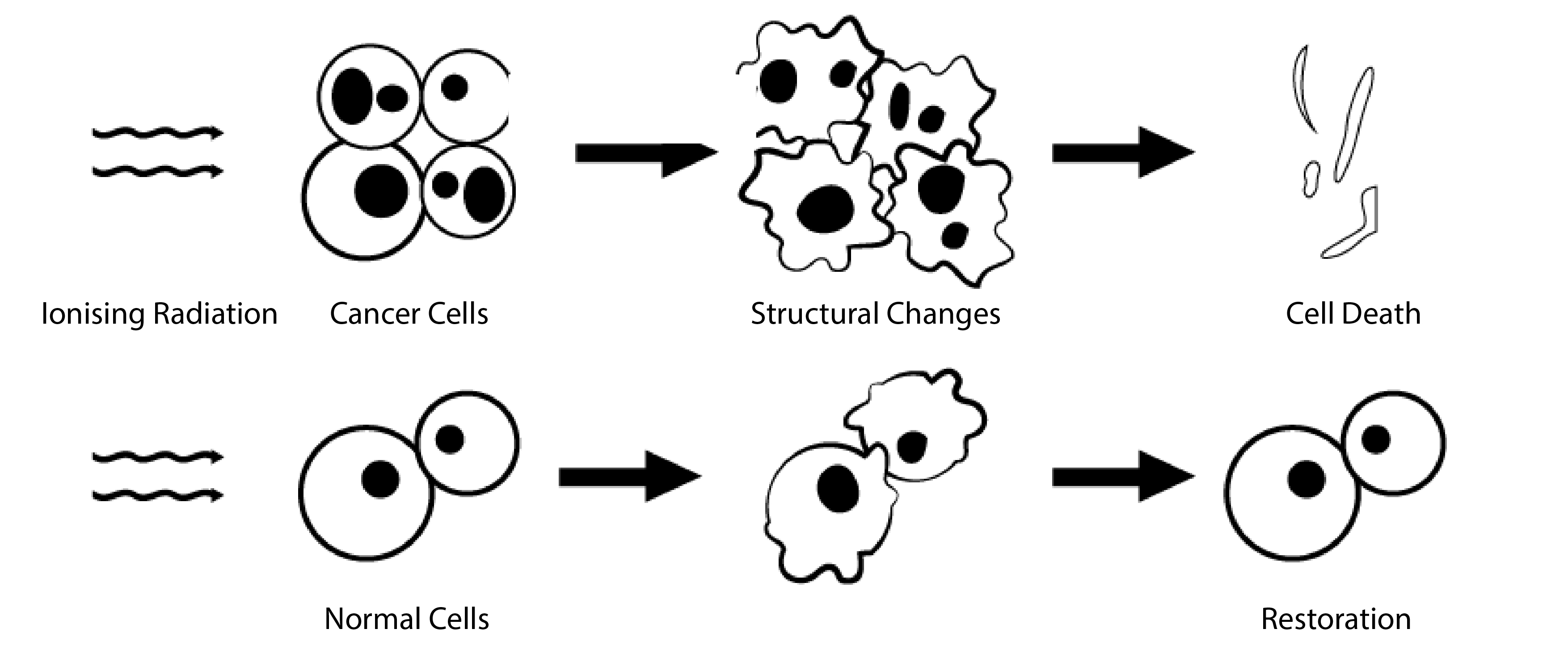Radiotherapy is a form of cancer treatment where beams of ionsing radiation are directed to a specific part of the body that harbours cancer. Individuals receiving this radiation treatment will experience some side effects.
What Is Radiotherapy Side Effect?
Ionising radiation can cause changes to cell structures. These structural changes will disrupt cell’s functions and are harmful to the cells.
Both cancer and normal cells in the treatment area that are exposed to this radiation will undergo these changes. Cancer cells that grow uncontrollably will receive severe damage and be destroyed while the normal cells with more organized growth are able to repair damages and restore cell functions. (Diagram 1)

Diagram 1: The effects of ionising radiation on cancer and normal cells.
Radiotherapy side effects are the reactions of normal cells towards radiation changes or damages and are restricted to the specific areas that receive ionising radiation only.
However not all cells have the same sensitivity towards radiation damages. Usually the fast growing and less specialised cells such as skin, mucosa lining of the food tract and intestines are more susceptible to these damages than bone and nerve tissues.
Early And Late Side Effects
Radiotherapy side effects can be divided into early and late effects. Side effects that developed during radiotherapy are considered as early effects. They generally happen 2 to 3 weeks after treatment has started. Examples of early reactions are skin changes, nausea and mild diarrhoea. These are temporary effects which are predictable. Their full recovery may require a period of 2 or 3 months after treatment has completed.
Late effects are symptoms that appear at the sites of radiotherapy, months or years after treatment has stopped. Examples of late effects are dry mouth due to damaged salivary glands and chronic cough because of lung tissues fibrosis, after receiving treatment at their specific sites. These will take a longer time to get back to normal, sometimes as long as 6 months or more.
Side effects such as loss of taste and induced menopause can be permanent if cell repair or replacement is not possible.
Severity Of Side Effects
Each individual has different responses towards radiation effects. Some have no or little effects; many will experience mild to moderate ones while only a few will suffer severe reactions.
The severity of side effects depends on the total radiation dose received, size of the treatment area, patient’s general condition and personal habits (smoking and drinking alcohol), and whether radiotherapy is delivered together with chemotherapy or not.
Generally side effects are more tolerable when the total radiation dose to the specific cell and the volume of tissue is small, good individual general health with good nutritional status, no smoking or alcohol consumption, and radiotherapy is given separately from chemotherapy. Radiotherapy may need to be suspended temporarily when side effects are severe.
Non-specific And Specific Effects
Side effects are categorised into non-specific and specific effects. Non-specific effect refers to the general body reaction to radiotherapy irrespective of the site of treatment. Specific effects are tissue dependent and confined only to the area that received radiation. (Refer to Radiotherapy side effects according to specific sites.)
The most common non-specific side effect of radiotherapy is fatigue. Fatigue is the feeling of tiredness, weakness, slowness and lack of energy to perform routine day to day functions. It usually builds up gradually as treatment proceeds and may last for a few months after treatment has completed.
This may be due to stress of the disease and daily travelling to attend treatment sessions. It can also be as a result of radiotherapy side effects like loss of appetite, anemia, pain, lack of sleep and depression. Moreover the body uses a lot of energy for cell repair and replacement during this period.
Simple Steps To Follow When Encounter Fatigue
- Find out which part of the day when you have the most or least energy. Schedule activities according to energy level.
- Conserve energy by doing only the most needful or important task when undergoing treatment.
- Plan your activities. Breakdown each activity into smaller steps to make it easier to complete.
- Space your activities with short rest and naps in between.
- Ask for help or accept assistance from family members, friends, social workers to manage housework, grocery shopping, food preparation and child care.
- Eat healthy food such as cereals and nuts, vegetables, white meat, eggs, fruits and juices or milk to boost energy.
- Increase fluid intake.
- Do simple exercise such as a short walk, stretches, yoga to boost blood circulation and energy.
- Avoid coffee, tea and soft drinks as caffeine can cause insomnia.
- Reduce or stop smoking.
Why You Need To Know About Side Effects?
Radiotherapy side effects cause discomfort and distress that will affect an individual’s daily life. Even though most side effects are unavoidable, they can be minimized with appropriate care and dietary adjustment.
Every individual who undergoes radiotherapy must find out about the expected treatment side effects. Talk to your oncologist, oncology nurse and radiation therapist about your experiences. By understanding why things happen will help you to cope better with side effects and can reduce treatment anxiety.
Reference
- American Cancer Society.Treatment and side effects. access 17/11/2013
- www.cancer.org/cancertopics/coping/radiation-therapy-and-you/page6-8. Radiation side effects and ways to manage them. access 17/11/2013
- Dollinger,M.MD, Rosenbaum,E.H.MD & Cable,G.(1991). Everyone’s Guide to Cancer Therapy. Somerville House Books Limited.
- Graphics by Ms Aishah bt. Zukifli
| Last Review | : | 26 May 2017 |
| Writer | : | Sarah Lee Abdullah |
| Accreditor | : | Dr. Ros Suzana binti Ahmad Bustamam |







